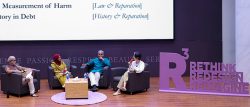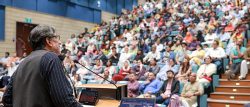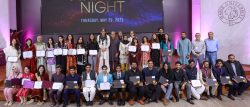Indus Earth CEO Shahid Sayeed Khan, while speaking here at a lecture on ‘Development with Dignity’, shared opportunities for mutual learning and collaboration
HABIB UNIVERSITY, March 8, 2016: Mr. Shahid Sayeed Khan, CEO of Indus Earth Trust (IET), delivered a well-attended talk here at the Tariq Rafi Lecture Hall on ‘Development with Dignity: The Trickle-Up Effect’. IET is a Pakistan-based, not-for-profit organization working in the area of sustainable development.
Mr. Khan had been invited by Dr. Shoaib Zaidi, Dean of Habib University’s School of Science & Engineering (SSE), to share his experiences in the area of sustainable development and his approach in uplifting neglected communities in Pakistan. His talk was part of the SSE Public Lecture Series, which regularly invites experts and respected scholars to share their knowledge and experiences on a public platform.
Mr. Khan had established IET in 2000 with the vision of helping the underprivileged build better lives. Qualified as an Environmental Architect in the UK, he had previously pursued a private practice in Scotland for 18 years and served as a consultant to the World Bank on projects in Afghanistan (Renewable Energies), Ethiopia (Water/land management), and Yemen (Livelihood Options). He has over 40 years of experience in architecture and rural development, and has been working in Pakistan since the early ‘90s.
IET works mainly in six districts in the Sindh and Balochistan provinces of Pakistan, mainly along the coast; covering approximately 900 kilometers covering 13 Union Councils and approximately 392 villages. IET has recently expanded its work to include urban “katchi abadis” in Karachi.
During his talk, Mr. Khan discussed the various projects undertaken by IET, explaining how it enables development by focusing on the underlying issues of socio-economic disadvantage. “lndus Earth Trust’s approach to the alleviation of poverty is through providing alternative income generation streams for the underprivileged within a holistic environmental protection framework, taking cognizance of climate change as a central policy,” reads IET’s Mission Statement.
Mr. Khan said:
lt is our intention to first provide the basic facilities and then create wealth at the grass roots thus evolving a ‘trickle up’ system. The ‘trickle down’ effect, talked about for so long by governments and institutions alike, only makes those at the top richer and those at the bottom poorer.
Throughout the presentation, as he took the audience through the different projects undertaken by IET, Mr. Khan urged Habib University’s students and faculty to join in, contributing research and knowledge to help IET deliver even more efficient and sustainable solutions to the people benefitting from its programs.
“You have the facilities and the people here, within Habib University, to help make a difference. Maybe some of you would like to join us and make our planned projects a reality,” he said.
The talk ended with a question-and-answer session, during which students and faculty members raised their concerns regarding development and poverty alleviation in general and climate change. Mr. Khan provided helpfully detailed answers, helping the audience understand that development is a multi-faceted, complex issue that needs to be handled with vision and care for those for whom it is targeted at.




